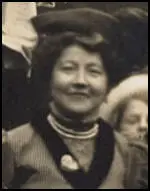Ada Flatman

Susan Ada Flatman, the daughter of George Flatman (1820-1890) and Susan Copsey Flatman (1830-1904) was born at Littleport, Cambridgeshire, on 15th August, 1876. Her father was a "Seed Merchant".
In 1901 Ada Flatman was a "skirt fitter" and was living with her married sister, Alice Flatman Gibbons and her husband, Thomas Percy Gibbons, "House Decorator" at 24 Landridge Road, Fulham.
Flatman became interested in the campaign for women's suffrage and in 1907 she joined the National Union of Women's Suffrage Societies. However, the following year she joined the Women Social & Political Union after hearing Christabel Pankhurst speak in the Royal Horticultural Hall.
By July 1908 she was working as a WSPU organizer. This included helping Mary Blathwayt in the WSPU shop in Bristol. In October she was arrested on a demonstration outside the House of Commons and sentenced to one month in prison.
In April 1909 Flatman went to help Gladice Keevil who had been appointed National Organiser in the Midlands and established a regional office in Birmingham. In May she became WSPU organiser in Liverpool where she worked closely with Alice Ker. She asked permission to open a WSPU shop in the city. Emmeline Pethick-Lawrence, the treasurer initially said no but eventually changed her mind with the words: "I have confidence in your sense of responsibility... I shall watch the result very carefully." It was a great success and in its first year it raised £592.

demonstration she organised in Liverpool (1909)
Flatman became WSPU organiser in Cheltenham in February 1911. The energy she put into her work helped to unseat the Liberal Party candidate in the by-election. Flatman also organised the WSPU campaign in the Ilkeston where the majority was reduced by 3,000 and in July she helped to defeat the Liberal candidate in the Crewe by-election.
On 4th August, 1914, England declared war on Germany. Two days later the NUWSS announced that it was suspending all political activity until the war was over. The leadership of the WSPU began negotiating with the British government. On the 10th August the government announced it was releasing all suffragettes from prison. In return, the WSPU agreed to end their militant activities and help the war effort.
Emmeline Pankhurst announced that all militants had to "fight for their country as they fought for the vote." Ethel Smyth pointed out in her autobiography, Female Pipings for Eden (1933): "Mrs Pankhurst declared that it was now a question of Votes for Women, but of having any country left to vote in. The Suffrage ship was put out of commission for the duration of the war, and the militants began to tackle the common task."

Ada Flatman disagreed with this approach and in 1915 she moved to the United States to work for The Suffragist, the newspaper of the Congressional Union for Women's Suffrage. After the war she wrote to Alice Paul asking if there was a salaried position for her with the National Woman's Party. She also offered her services to the Women's Enfranchisement League in South Africa, but was again turned down.
In 1946 Ada Flatman gave a radio interview to the BBC, Ada Flatman: A Militant Suffragette, on her activities in the Women Social & Political Union.
Ada Flatman, who lived at 11 Upperton Road, Eastbourne died on 26th February 1952 at The Berrow Nursing Home.

